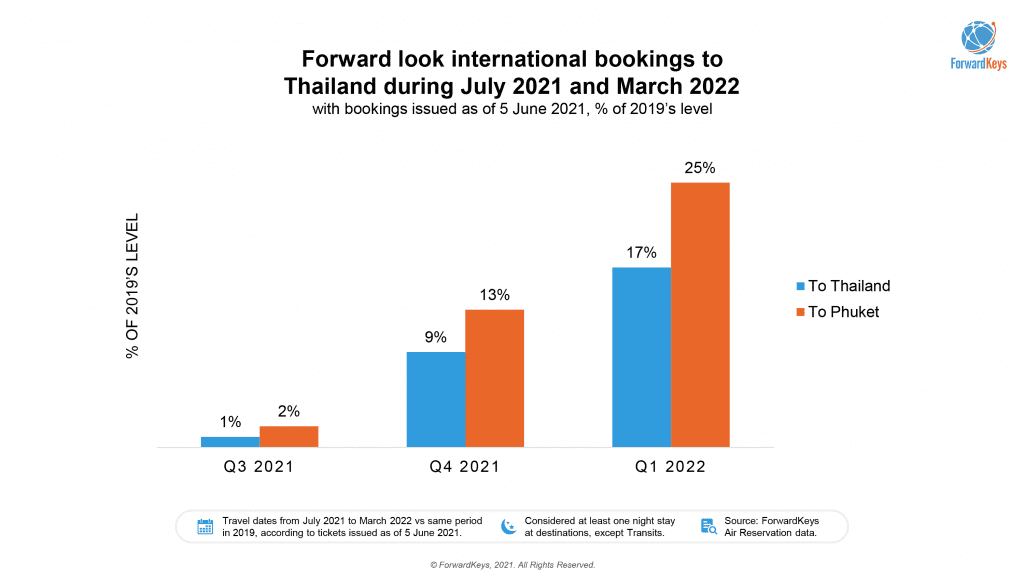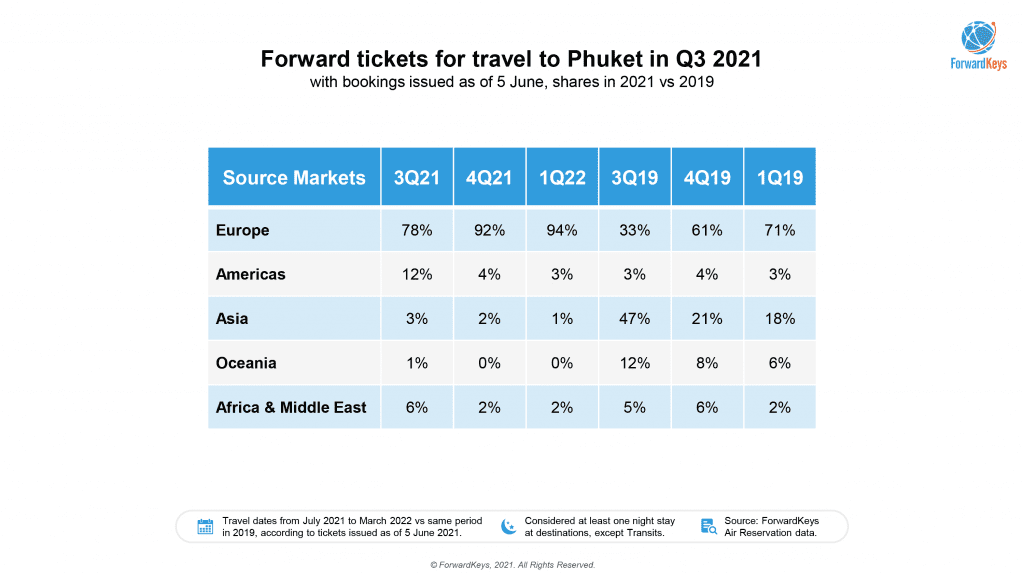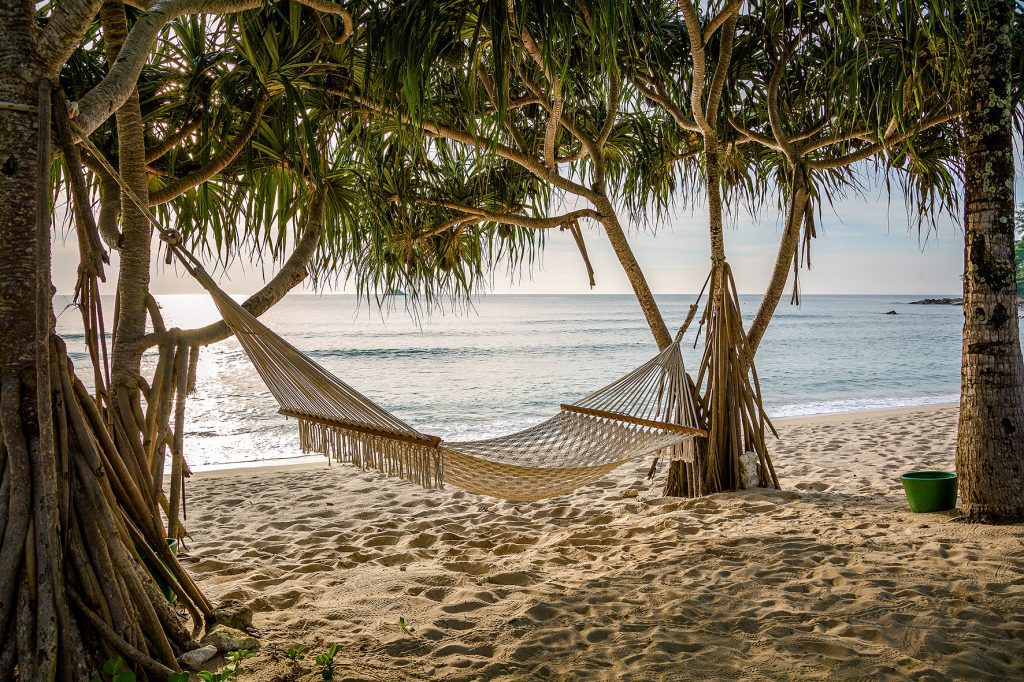Skift Take
Booking data suggests a modest outcome for Thailand's reopening this summer, but it gets better in winter. For international arrivals volume to be amazing again, that'll take some time, probably two years.
For all the criticism and ridicule that has been heaped on Thailand for its fussy and arduous roadmap to reopen from July 1, starting with Phuket, the kingdom may still have the last laugh as the one that led the unlocking of international travel in Asia.
The Maldives may have been first to reopen in the region but Thailand, with 40 million arrivals in 2019 versus Maldives’ 1.5 million, is the real litmus test.
Much is at stake for Asia’s top volume destination (excluding Greater China). It is attempting a reopening at a difficult time. When the Phuket “sandbox” model was mooted earlier this year, Thailand didn’t imagine the worst Covid-19 flare-up it faces today.
Its pride at excellent virus management dented, the country is tightening the screws to ensure the safest possible reopening, even though Phuket now has less than five new cases per day and is said to be on track to achieve herd immunity.
Thus weeks to go to July 1, officials are still dotting the i’s and crossing the t’s to reopen the popular Thai resort island without quarantine to vaccinated travelers. The initiative hasn’t even been published in the Royal Gazette, which is the “holy grail” of approval. This, along with significant changes to rules so late in the day, makes it hard for Thai inbound travel agencies to market the reopening, they said.
It also makes it harder for Phuket hotels, 40 to 70 percent are estimated to be closed due to poor business, to decide whether or not to reopen. Moreover, July to September is low season due to the wet monsoon. Tighter rules or a lack of clarity can also put off some clients. For instance, vaccinated travelers must now stay in Phuket for 14 nights, from seven initially, before they can visit other Thai destinations.
The Tourism Authority of Thailand on June 9 released the “initial” information on reopening Phuket, stressing it is “a living document” and that more details will be provided as soon as officially-approved directives from the Thai government are available. But as it is (read it here), some may already conclude it’s too troublesome to visit at this time.
As more countries in the West reopen to vaccinated travelers with minimal restrictions and maximum confidence, Thailand’s maximum rules and minimal confidence negates the PR and marketing value of the sandbox scheme. It also creates unnecessary doubts such as, is Thailand being so finicky because it actually couldn’t achieve herd immunity in Phuket by July 1?
Dress Rehearsal
Yet, the outcome may be perfect for Thai officials for whom the sandbox is a dress rehearsal to welcome back international tourists in the peak winter season, October to March 2022. If the sandbox proves safe, it will also be the model for other Thai destinations to reopen.
Thailand targets only 129,000 overseas arrivals in July-September in the country, with Phuket as the main destination, said Tourism Authority of Thailand deputy governor Asia and South Pacific, Chattan Kunjara Na Ayudhya.
July 1 is not the “culmination,” but just the beginning of travel reopening, he said at a hybrid event on June 8 organized by the Foreign Correspondents Club of Thailand.
ForwardKeys data, as requested by Skift, shows that indeed the sandbox will produce a modest outcome in the first three months. But the volume will gradually rise in the peak winter season October-March 2022.
Based on air tickets issued as of June 5, ForwardKeys data shows Phuket will have 2 percent of 2019’s volume in July-September, but this will jump to 13 percent in October-December, and 25 percent in first quarter 2022 (see chart).
This is unsurprising, as the winter season is when “snowbird” travelers migrate from the West to bask in Thailand’s sunshine and service, both of which are very warm.
What is surprising is the strength of the Israel market this summer. For the first time, Israel, a relative newcomer, ties with the UK as the top source for Phuket in July-September, with Germany as second biggest source. El Al starts operating a daily direct flight from Tel Aviv to Phuket from July 1.
“This shows the industry needs to look at other factors, beyond travel restrictions, that will shape travel decisions and change traditional market sources and segments. These factors include airline connectivity, currency and safety perceptions such as racism,” said Jameson Wong, director Asia-Pacific for ForwardKeys.
Europe (including Israel) is the dominant source for Phuket this summer, accounting for 78 percent of bookings, followed by Americas at 12 percent and Africa/Middle East at 6 percent (see chart). In a reversal, Asia/Oceania is but only 4 percent, from 59 percent in 2019, due to travel restrictions and/or quarantines upon return.
 In the fourth quarter and first quarter 2022, Europe will virtually be the source market for Phuket (over 92 percent). More than 50 percent of these travelers are staying between 15 and 21 days.
In the fourth quarter and first quarter 2022, Europe will virtually be the source market for Phuket (over 92 percent). More than 50 percent of these travelers are staying between 15 and 21 days.
Krystal Prakaikaew Na-Ranong, co-founder/owner of the five star hotel The Slate Phuket, said hoteliers are waiting for Thailand to establish travel corridors with Singapore, Vietnam and other neighboring destinations.
“That will help,” she said. “Enquiries and bookings are coming in but more for October [onwards] than for summer. But it [sandbox] is a good start, with direct flights coming into Phuket.” (See here for other airlines that are operating to Phuket.)
“Greng Jai”
In public, Thai tourism members keep an optimistic front and laud the sandbox as something of a miracle, where the state government, provincial government, various ministries and industry sectors are able to come together to chart an unprecedented travel reopening.
“What makes this different [from past crises] is it involves public health, local and national governments, foreign affairs, airports authority, et cetera. The kitchen is full of cooks, so some chaos is to be expected,” said Bill Barnett, managing director of C9 Hotelworks and founder of Phuket Hotels Association.
But a local hotel owner with properties in Bangkok and Pattaya spoke of Thailand’s “Greng Jai” culture, which makes the reopening process akin to “moving mountains.”
“You can’t order an official to do something, you have to ask for it politely. It’s mediation over confrontation,” said the owner.
It’s easy to see how a melting pot of “Greng Jai,” differing agendas of various ministries and fat bureaucracy is resulting in a compromise, and a small outcome of 2 percent after reopening is being hailed as good enough.
But this masks the hardship that tourism players are facing. Average occupancy countrywide in May was 6 percent, with June being no better, as the third wave is keeping Thais at home, said Marisa Sukosol, president of Thai Hotels Association and executive vice president of Sukosol Hotels.
Half of 16,000 registered hotels in Thailand are still closed. Of those opened, more than 60 percent said in a survey that their revenue is below 10 percent over 2019, and 50 percent said their cashflow would last for another two to three months only.
“Thailand’s National Economic and Social Development Board has revised its international arrivals forecast to 500,000 this year, which is horrible,” said Sukosol. “We had 6.7 million last year [mostly in the first quarter before Covid hit].”
As for domestic travel business, income from Thai tourists last year dropped 55 percent over 2019, which means Thais are spending less.
“We are hanging by a thread,” said Sukosol.
In Phuket, average occupancy is more or less 10 percent in the first six months, said Anthony Lark, Phuket Hotels Association president and executive director of Montara Hospitality Group, which owns the luxury hotel Trisara.
“We are forecasting this to increase to 15-20 percent July to October, and 30-40 percent November-March 2022.”
On how many Phuket hotels will reopen, Lark said half of closed hotels “wait-and-see” how the reopening unfolds. “No one wants to reopen at sub 10 percent occupancy. They closed because there’s no cashflow. To reopen involves re-employment, training, maintenance, all of which costs a lot of money,” said Lark.
Nothing is Risk-Free
The destination itself faces risks of reopening. Lark admits the association is “a little worried” about what tourists may be sharing on social media “of devastated Phuket villages such as Patong, Kata and Karan which have seen thousands of people leaving and small businesses closed down.”
“Some of these concerns are real,” he said. “But our community is getting together, restaurants are reopening and staff are returning from other provinces and are getting vaccinated. This is a process of baby steps.”
The province is also aware of the risk of an increase in Covid infections, as vaccinated tourists can still carry the virus, he said. “Yet those concerns are mitigated by the fact that the Phuket population has really done a great job with vaccination. You hear rumors about locals not wanting to vaccinate, but if you see the long queues of people from all walks of life at the six vaccination stations around Phuket, it is heartening,” said Lark.
Phuket may also lose domestic travelers who fear catching infections from vaccinated tourists. “Certainly this is a concerned and will likely inhibit demand or push Thais to Krabi, Khao Lak or other drive/fly locations,” said C9 Hotelworks’ Barnett.
But not to reopen also poses consequences. Chiefly, Thailand’s battered tourism industry can’t take it anymore, and the peak winter season 2021/2022 will be lost, which is disastrous.
Ruth Landolt, general manager of Asia365, a European tour operator with Swiss and German clients, said, “We have quite a lot of requests for November onwards. Clients are waiting to finalize bookings, because they want to trust that the destination will really open. This is why psychologically it is extremely important that the sandbox materializes.”
Hopefully, more bookings will materialize once the world sees Thailand has opened. Hopefully, too, it will be a reopening without incident, which will strengthen Thailand’s confidence and lead to a relaxation of rules in the months ahead.
Most importantly, hopefully Thailand’s vaccine management, not just virus management, will keep pace.
Then, it’ll be amazing.
The Daily Newsletter
Our daily coverage of the global travel industry. Written by editors and analysts from across Skift’s brands.
Have a confidential tip for Skift? Get in touch
Tags: phuket, reopening travel, thailand
Photo credit: A hammock in Phuket awaits tourists. QUO / Phuket Hotels Association
